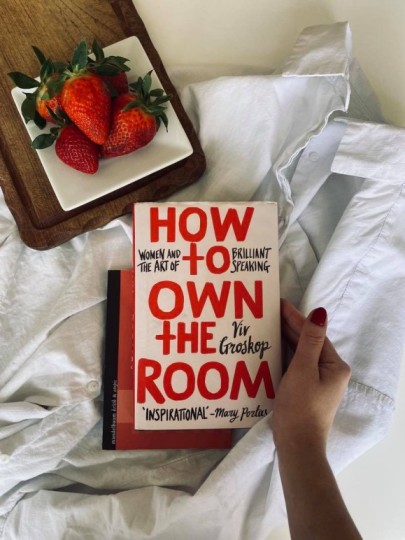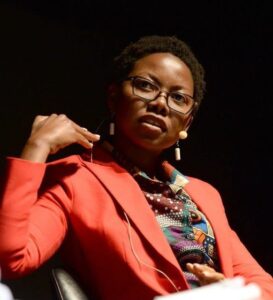You have been there, more than once: watching Chimamanda Ngozi Adichie speak and admiring how easy the words roll off her tongue, how effortlessly she segues from one idea to the other, blending humour and wisdom into powerful moments. You want that for yourself: to hold a crowd’s attention and speak with clarity and purpose.
Viv Groskop, a British writer, stand-up comedian, and TV and radio presenter, has answered your prayer. Her book, How to Own the Room: Women and the Art of Brilliant Speaking, gives insights on how to master the art of public speaking. It draws examples from a long list of renowned female speechmakers from Adichie to Oprah Winfrey to Michelle Obama to JK Rowling to Virginia Woolf.
Here is the synopsis.
Most books about public speaking don’t tell you what to do when you open your mouth and nothing comes out. And they don’t tell you how to get over the anxiety about performance that most people naturally have. They don’t tell you what to do in the moments when you are made, as a woman, to feel small. They don’t tell you how to own the room. This book does.
From the way Michelle Obama projects ‘happy high status’, and the power of J.K. Rowling’s understated speaking style, to Virginia Woolf’s leisurely pacing and Oprah Winfrey’s mastery of inner conviction, what is it that our heroines do to make us sit up and listen – really listen – to their every word? And how can you achieve that impact in your own life? Here’s how.
A chapter in the book, “It’s OK to Speak from Notes,” is dedicated to Chimamanda Ngozi Adichie. Below is a brief excerpt.
It’s OK to speak from notes
Chimamanda Ngozi Adichie’s two most legendary speeches have gone viral and had over 15 million views each. She has also given dozens of other speeches worth watching, including a recent one in which she talked about the importance of intention and what happened when she was introduced as ‘Chimichanga’. Her conclusion: it’s fine to call her Chimichanga by accident and if you tried hard to pronounce her name. It’s not fine if you say it because you’re too lazy to bother or you’re mocking her. She did add that these things are not that big a deal for her as in her native language, Igbo, her name means: ‘My personal spirit will not be broken.’ I would suggest that you do not mess with such a person, not even accidentally.
Adichie’s highly successful speeches are worth studying because she gives them on her own terms. She is not an improviser; she is not an emotional person; she is highly organized. I don’t want to go too far into the realms of speculation but I would suggest from her stance and habits at these speeches – and from some of the insights into her character that she gives in them – she is probably a control freak. Many women can identify with that. Why leave an important speech to chance? Or to an autocue that might malfunction?
So, unlike many other TED Talkers, she reads from a lectern instead of pacing the stage. This gives us something to think about when we consider what it means to ‘own the room’. You connect with the audience through your energy and excitement and by moving around. Or you can do it by standing your ground. Many speakers will say that you can’t ‘connect’ in a meaningful way by reading something prepared that’s in front of you. You need to learn it (and not use notes), you need an autocue or you need to be prepared to improvise. (I think elements of Ellen DeGeneres’s commencement speech must have been improvised. She’s an example of the opposite of a control freak.) But Chimamanda Ngozi Adichie’s speech shows you can read aloud (about storytelling and feminism) and still have your words connect with an audience in an incredibly powerful way.
Read the full chapter on The Women’s Prize for Fiction website.




